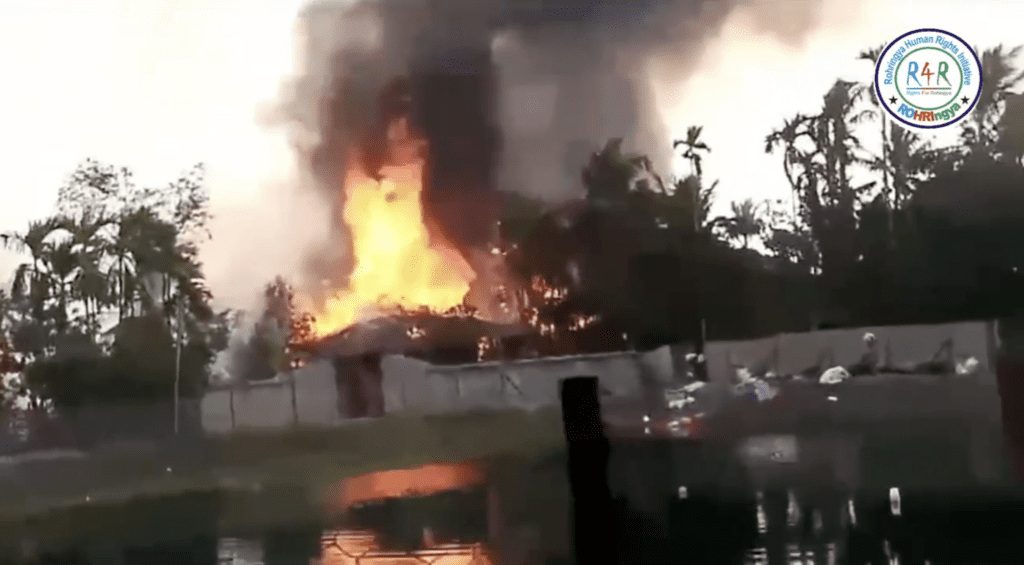
Fighting in Myanmar’s Rakhine State has surged in recent weeks, causing civilian casualties and large-scale displacement, Human Rights Watch said. Myanmar’s junta and the Arakan Army ethnic armed group should take immediate measures to minimize harm to ethnic Rohingya and other civilians caught up in the hostilities.
On November 13, 2023, renewed fighting between the Myanmar military and Arakan Army ended a year-long unofficial ceasefire in Rakhine State. Since January 2024, Myanmar military forces have attacked Arakan Army fighters deployed in Rohingya villages, particularly in south Buthidaung township, which has resulted in civilian casualties and destruction of property, according to residents, Rohingya groups, and the media. Over 100,000 people in Rakhine State, many displaced by previous violence, have again had to relocate.
“Myanmar military and opposition forces need to do all they can to minimize civilian casualties and destruction of homes and property,” said Shayna Bauchner, Asia researcher at Human Rights Watch. “Rohingya villages that were devastated by military atrocities in 2017 are again at grave risk of attack.”
Nine witnesses from Hpon Nyo Leik, a predominantly Rohingya village tract in Buthidaung township with over a dozen hamlets, said that Arakan Army fighters entered the area in late January in an apparent effort to gain control over a nearby Myanmar military command. The military soon responded with helicopter gunship attacks, artillery shelling, and ground assaults.
“The Arakan Army suddenly entered our area and started deploying all around the village,” a 30-year-old villager said. “Soon after, three artillery shells fell in our area. One of the shells exploded in the local market, critically injuring four people. The explosion of another shell injured six people, and the third one injured three.” When the villagers told the Arakan Army that their presence was making them unsafe, the fighters said they would leave when they received orders to do so. “We Rohingya are dying, caught between the two parties,” the villager said.
Residents and rights groups have reported that during the fighting in late January, between 12 and 24 Rohingya civilians were killed, while as many as 100 more may have been injured. More than 100 homes are believed to have been damaged or destroyed, according to Rohingya groups.
“On Friday morning [January 26] the military intensified its offensive,” the villager said. “One of my cousins died on the spot. Almost all of my family members were injured and admitted to the hospital. My brother is still struggling to recover as one of the bomb fragments in his body hasn’t been removed.”
Rohingya villagers said that all the beds in the hospital in Buthidaung and local clinics were filled and that the facilities had stopped admitting people. Clinics were running low on supplies and charging injured patients exorbitant prices.
Some residents described the Myanmar military’s airstrikes on their village as indiscriminate bombardments.
The junta has continued to block urgently needed humanitarian aid to civilians in conflict areas, a form of collective punishment that is a war crime. The military is blocking major roads and waterways, destroying nonmilitary supplies, imposing severe restrictions on aid workers, and shutting down telecommunications services. The humanitarian organization Médecins Sans Frontières (MSF) said on January 16 that the authorities were preventing the operation of its 25 mobile clinics in Rakhine State and warned of a “catastrophic impact on people’s health.”
Since the February 2021 military coup in Myanmar, the junta has driven the country further into a humanitarian and human rights catastrophe. The junta’s widespread and systematic abuses amount to crimes against humanity and war crimes.
More than 700,000 Rohingya fled the Myanmar military’s crimes against humanity and acts of genocide in 2017. About 600,000 Rohingya remain in Rakhine State, confined to squalid camps and villages under a system of apartheid in which security forces have arrested thousands of Rohingya for “unauthorized travel” and imposed new movement restrictions and aid blockages. This has left the Rohingya particularly vulnerable to armed conflict.



